“We are building the future of our services ourselves”
The SQUAD evaluation is designed to make our education and research support fit for the future. DML and IMS are the first two services to kick off this process.
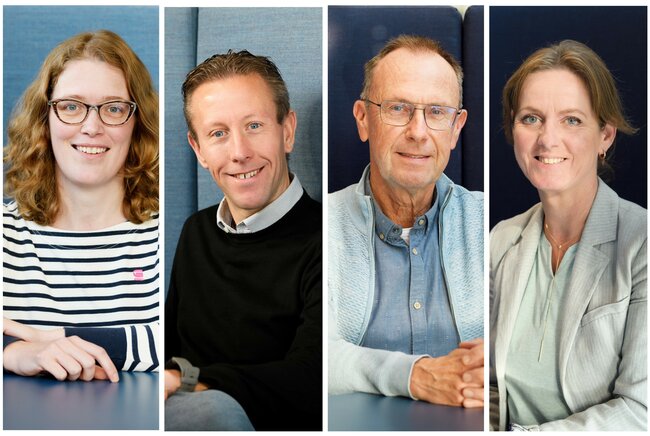
Actually it is a fulltime job alongside their own already busy positions at Information Management and Services (IMS) and Data Management and Library (DML), but the members of the SQUAD project team are proud to be able to help shape the future of their own services. “Together with our partners we are looking at how we can better design our processes. This is truly coming from all levels of our departments,” says project team member Vanessa Henraat.
‘You travel faster alone, but farther together.’ For Dennis Raijmakers, SQUAD project team member representing IMS, this is the crux of the process in which his service IMS and DML are currently involved. Together with his IMS colleague Karin van der Esch and DML staffers Vanessa Henraat and Stefan Osinski, he is driving forward the first round of the SQUAD program. They got underway in September, with the help of the SQUAD program team and an external change manager. At the end of February a draft change plan is due to be presented to the services, after which it will be submitted to an external review committee.
Information Management and Services (IMS) and Data Management and Library (DML) are the first two services to undertake the cycle of self-evaluation, and they are doing it hand in hand. The point on the horizon is the delivery of a change plan to improve service provision, designed to make these services fit for the future. During the process, customers - students and employees of TU/e - and the some two hundred colleagues within IMS and DML will be involved as much as possible. This will be achieved with newsletters, during departmental meetings, but also in chats at the coffee dispenser.
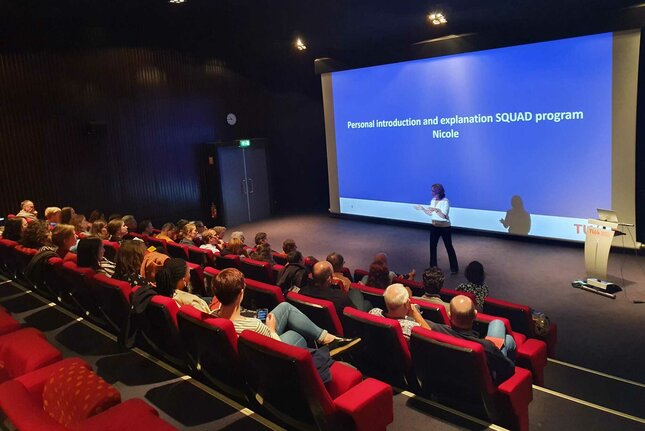
“The sentiment about SQUAD varies among my colleagues,” says Raijmakers, director of information management and deputy director of IMS. “There is a group who are on edge about this and that is only logical. We are trying to pay the proper attention to their concerns. And there is a group that is impatient. They know improvement is needed within IMS and are keen to move ahead.”
Transition already underway
Henraat, project leader data management at DML, says that within her service DML there are concerns for the future, partly because director Merle Rodenburg is transferring to the Department of Built Environment in January 2022. “During the kick-off session our colleagues were able to put their questions to Executive Board member Nicole Ummelen. She said that a solution was actively being sought for the departure of our head of service. It felt good to be able to discuss this matter properly.”
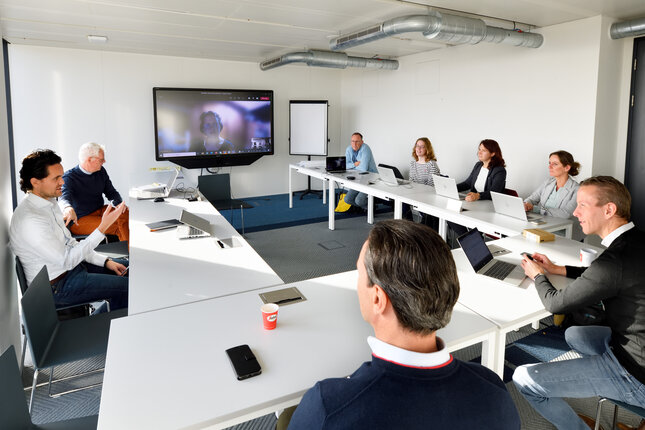
Henraat's colleague Stefan Osinski, head of the DML team General Data Management, adds that Rodenburg started a transition process when she took up the position of director of their service. “We moved - to put it simply - from being a library and archive to general data management, to research data management, and, alongside the library function, to adopting open science and open access. So we have already made considerable progress when it comes to optimizing our service provision. SQUAD feels like a logical continuation.”
Pioneering
Just you try being the first project team to get this sorted in six months, with all the eyes of the other services on you while they wait their turn. “Now and then there's a bit of pioneering involved,” says Van der Esch, who as policy officer at IMS has long been occupied with improving service provision. “Some things have been organized, others not. We are involving other services in our activities as much as we can. Hopefully when their turn comes they'll benefit from what we've put in place in our round.”
Osinski also expects this will help subsequent rounds to proceed more smoothly and quickly. “Every week something crops up that we hadn't thought of or that we have to resolve. Later rounds of SQUAD won't face these pitfalls.” Henraat adds that to ensure this they are also coordinating with colleagues and directors from other services. “We are thinking not only in terms of DML and IMS, we're also doing the groundwork for others.”
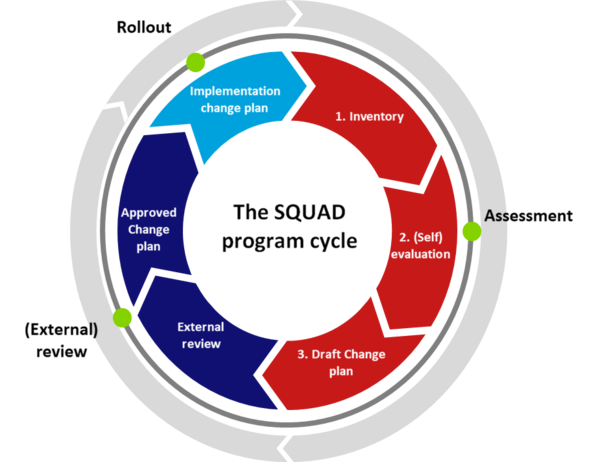
Baseline measurement
“If we all stick to the same system, it will be easier to compare the services later on. Especially if we want to repeat this process of self-evaluation every so many years, it is going to be really useful if everyone takes the same approach. Then SQUAD will create a good baseline measurement,” believes Raijmakers.
He thinks it is more by design than chance that their services are the first up to bat in SQUAD. “We are used to project-based working and to running big programs. Think of the implementation of a new financial system, or replacing Canvas. These are complex programs with huge numbers of involved parties. SQUAD is also a huge and complex process, only now we are working on our own development.”
Osinski adds that the two services already know each other well. “My team, General Data Management, for instance, liaises closely with Information Management within IMS. There's a lot of overlap and we strengthen each other. The same applies to privacy and security. It makes sense for us to go through this SQUAD process together. It doesn't automatically mean that at some stage we will merge our services, but in certain areas I can see scope for increased cooperation.”
Focus
The project team's focus within SQUAD is on the assessment phase, the outcome of which will be a change plan for the two services. The stocktaking phase has involved looking at the respective aims of the services, how they are organized and what they deliver. Step two is the self-evaluation, including the customer and employee satisfaction studies and the EFQM evaluation. The findings and outcomes of these exercises will be shared with everyone within DML and IMS.
Together
The main appeal for Henraat is the chance to go through the process together. By which she means not only with her colleagues in the project team, but also her colleagues within the two services. Sixty employees of IMS and DML recently got started in the six work groups set up for SQUAD. “It is just great to brainstorm with colleagues about what is going well, where the sticking points are, how we are going to address them. It's a way of involving the whole department in the process. And as departments we are learning from each other by asking questions: why do you do things this way rather than that way? It gets you thinking about your own processes.”
According to Raijmakers, it cuts both ways : “We are giving those of our staff who want it maximum involvement in the work groups, and they are taking a lot of work off our hands. There is so much to do in so little time. It's more than we as the project group can manage on our own.” The work groups are focusing on the following themes:
● customer satisfaction study
● satisfaction study among DML and IMS staff
● quality study applying the EFQM model, to assess the maturity of the organization
● chains and interfaces; what relationships exist between DML and IMS, and between the services and their environment
● competences for the future
● the financial picture
Above the work groups hang the overarching themes of change management and communication. For the first theme, an external change manager will help to create a support base for the changes. “So that ultimately we produce a plan that we all feel invested in, that we ourselves have come up with for our own future,” says Henraat.
The project team wants to gain an understanding of the sticking points and areas ripe of improvement; they will be talking to the services' customers via as many channels as possible. “We are holding round table sessions with representatives of the student body, the academic staff and the support staff,” explains Raijmakers. “We'll also be drawing input from across the university by sending out our staff to talk to people, like roving reporters. They will be asking their interviewees what they think is being done well and where there is room for improvement. In this way we hope to get input from different perspectives.”
Funneling
The project team members are looking forward to seeing the findings of the studies of customer and employee satisfaction, which will be distributed this week. The former will be sent to a TU/e-wide selection; the latter to staff of DML and IMS. “The questionnaire has been created by the work group with the help of an agency experienced in running studies like these. We have produced themes for the customer satisfaction study based on the services we provide. Think of security, the library, data management. We'll be submitting the draft to a number of directors of services and departments and to people across the university: are these the right questions for us to be asking our customers?” says Henraat. “We'll be distributing it to thousands of people in total,” says Raijmakers, “to get as big a response as possible.”
“Eventually all the findings will be funneled together. I wonder whether our own findings will be confirmed or whether there will be a few surprises,” says Van der Esch. “The really big learning curve for us will be when we bring together the output from all the various channels. It will be really illuminating to see where the similarities in opinion lie. I'm really looking forward to that,” adds Henraat. Osinski isn't expecting any big surprises.
In answer to the question what are they proud of, Henraat says, “of how together we are building our future.” Van der Esch agrees: “I hope that we keep on doing this in the future, so that we continually improve working and studying at TU/e.” Osinski: “I'm curious about the phase when all the services have completed a SQUAD process, what the future will look like then. That's going to be something that determines whether or not this is a success. Because it is not about this pilot, or about the process the other services go through; it is about optimizing the entire chain of service provision at our university.”
More on our strategy
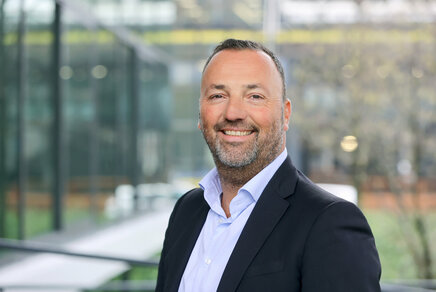

![[Translate to English:] [Translate to English:]](https://assets.w3.tue.nl/w/fileadmin/_processed_/c/f/csm_BvOF_2024_0319_AEV_license_TUe_Dirk_van_Meer_-_CORE_1__c976e259a5.jpg)
